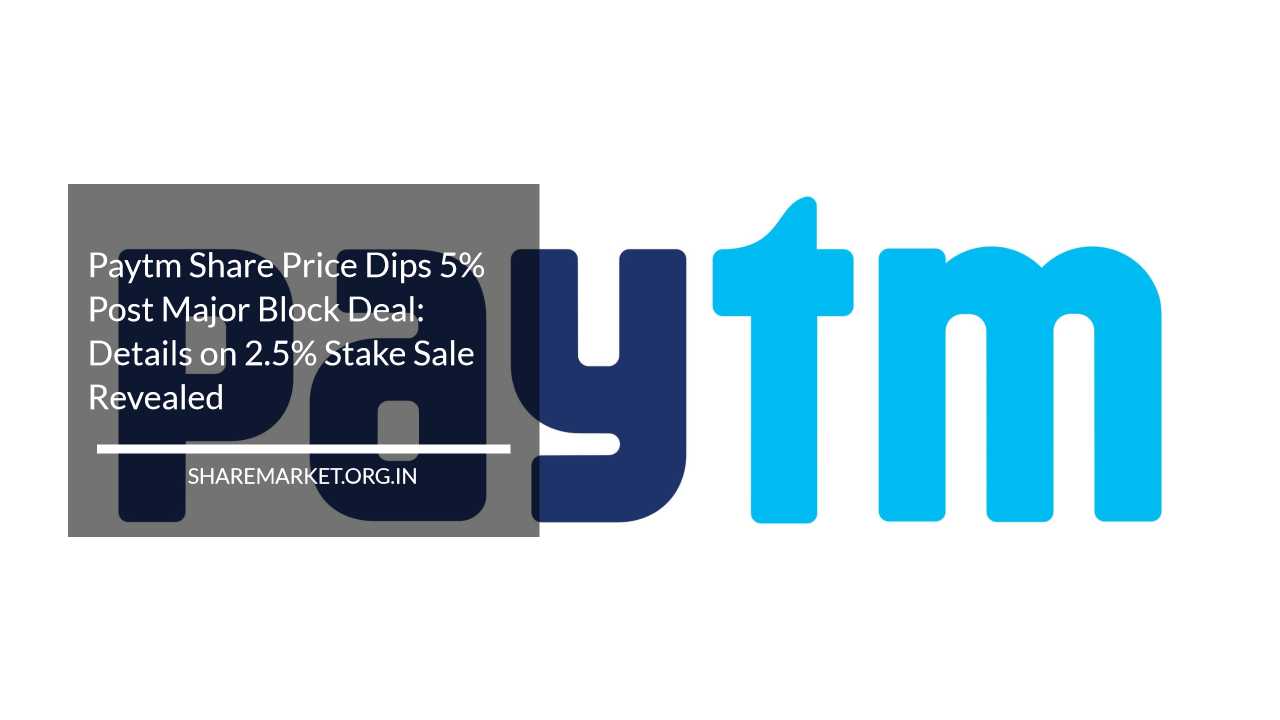Paytm Share Price Dips 5% Post Major Block Deal: Details on 2.5% Stake Sale Revealed

Paytm Share Price
Paytm Stock Decline: Unraveling the Aftermath of a Block Deal and Regulatory Changes
Paytm, a prominent player in India’s financial technology sector, recently experienced a notable downturn in its stock price, witnessing a decline of approximately 5% following a substantial block deal.
This transaction, involving the trading of around 1.6 crore shares of Paytm, equivalent to 2.56% of its equity stake, took place on a Friday.
The shares were transacted at an average price of Rs 884, accumulating a total value of approximately Rs 1,441 crore.
The aftermath of this deal saw Paytm’s stock reaching a low of Rs 880 per share during the trading session, marking a significant intraday decline of 4.6%. As of 2 pm, the stock was trading at Rs 891.45, indicating a decline of around 3.45%.
Block Deal Secrecy:
One intriguing aspect of this development is the undisclosed nature of the entities involved in the block deal. As of the latest available information, the names of both the sellers and buyers remain shrouded in secrecy.
This lack of transparency adds an element of mystery to the transaction, leaving market observers and investors speculating about the motives and strategies of the parties involved.
Regulatory Dynamics:
The broader market context surrounding Paytm’s stock also contributes to the complexity of its recent performance.
The Reserve Bank of India (RBI) has implemented regulatory changes that have implications for lending practices, particularly affecting fintech intermediaries like Paytm. CLSA, a renowned brokerage firm, opines that while there may be some impact, it is not expected to be significant.
However, Jefferies takes a more cautious stance, anticipating potential challenges to Paytm’s earnings due to stringent rules, increased interest rates from banks, and potential restrictions on partnerships.
MSCI Global Standard Index Inclusion:
In addition to regulatory dynamics, Paytm’s stock has been in the spotlight for other reasons. The company recently gained attention for its inclusion in the MSCI Global Standard Index.
According to a report by IIFL Alternative Research, this inclusion is expected to attract an investment of about $140 million in Paytm’s shares. Nuvama Alternative and Quantitative Research go even further, estimating a substantial investment of $162 million in the wake of this development.
Positive Momentum and Performance:
The positive momentum generated by Paytm’s inclusion in the MSCI Global Standard Index adds a layer of optimism to the narrative.
This global recognition not only enhances the visibility of Paytm but also positions it as an attractive investment opportunity for international investors seeking exposure to the Indian market.
The influx of foreign funds following such index inclusions has historically been a significant driver of stock prices.
Despite the recent dip, Paytm’s stock has displayed remarkable resilience and growth throughout the year 2023.
The year-to-date return stands at an impressive 68%, outperforming the Nifty, which has seen an 8% rise over the same period.
This stellar performance underscores the investor confidence in Paytm’s business model and growth prospects.
Brokerage Recommendation and Future Outlook:
Jefferies, in a report released on October 18, expressed confidence in Paytm’s future performance by recommending a buy on its stock with a target price of Rs 1,300.
The brokerage’s optimism is rooted in its belief that Paytm is poised to turn profitable in the next four quarters. This positive outlook is attributed to the substantial growth observed in Paytm’s credit business and its ongoing efforts in monetization.
The credit business, a key segment for Paytm, is expected to play a pivotal role in its journey towards profitability.
As the demand for digital financial services continues to rise, Paytm is strategically positioned to capitalize on this trend.
The company’s foray into lending has the potential to diversify its revenue streams and contribute significantly to its bottom line.
Monetization Efforts and Strategic Initiatives:
Monetization efforts, another focal point for Paytm, involve capitalizing on its extensive user base and platform to generate revenue through various channels.
As a multifaceted financial services provider, Paytm has the advantage of offering a wide range of services, including payments, banking, and investment products.
Leveraging this comprehensive suite of services allows Paytm to explore diverse monetization avenues, mitigating the risks associated with over-reliance on a single revenue stream.
The recent regulatory changes introduced by the RBI, while causing some concerns in the market, are not expected to fundamentally alter the trajectory of Paytm’s growth.
The company has demonstrated agility in adapting to regulatory shifts in the past, and its proactive approach positions it well to navigate the evolving regulatory landscape.
Resilience and Long-Term Prospects:
It’s worth noting that the fintech sector, of which Paytm is a prominent player, operates in a dynamic environment where regulatory changes are not uncommon.
The ability to navigate and adapt to these changes is often viewed as a testament to the resilience and maturity of a company. Paytm’s proactive engagement with regulators and its commitment to compliance are key factors that instill confidence in investors.
The inclusion of Paytm in the MSCI Global Standard Index further underscores its standing as a significant player in the global financial landscape. Such inclusions are not only a recognition of a company’s performance but also serve as a validation of its governance standards and adherence to global best practices.
This recognition can attract a new wave of institutional investors who rely on indices like MSCI for making investment decisions.
Investment Estimates and Financial Firepower:
The estimated investments of $140 million and $162 million from IIFL Alternative Research and Nuvama Alternative and Quantitative Research, respectively, following Paytm’s inclusion in the index, highlight the potential for increased liquidity and demand for the company’s shares.
This injection of capital can provide Paytm with the financial firepower to pursue strategic initiatives, invest in technological advancements, and fuel further expansion.
Final Thoughts:
While Paytm’s recent stock decline following the block deal and regulatory changes should be viewed in the context of broader market dynamics, its long-term prospects remain promising.
The fintech industry, driven by technological innovation and changing consumer preferences, is poised for sustained growth. Paytm, with its comprehensive suite of financial services, robust technological infrastructure, and strategic vision, is well-positioned to capitalize on the evolving landscape.
In conclusion, Paytm’s recent challenges, including the stock decline and regulatory shifts, should be considered as part of the company’s dynamic journey in the fintech sector.
While short-term fluctuations are inevitable, the company’s strong fundamentals, strategic initiatives, and positive outlook from reputable brokerages signal a promising future.
The inclusion in the MSCI Global Standard Index further enhances Paytm’s global visibility and attractiveness to investors.
As Paytm continues to navigate the complexities of the fintech landscape, its ability to adapt, innovate, and capitalize on growth opportunities will likely play a crucial role in shaping its trajectory in the years to come.

















